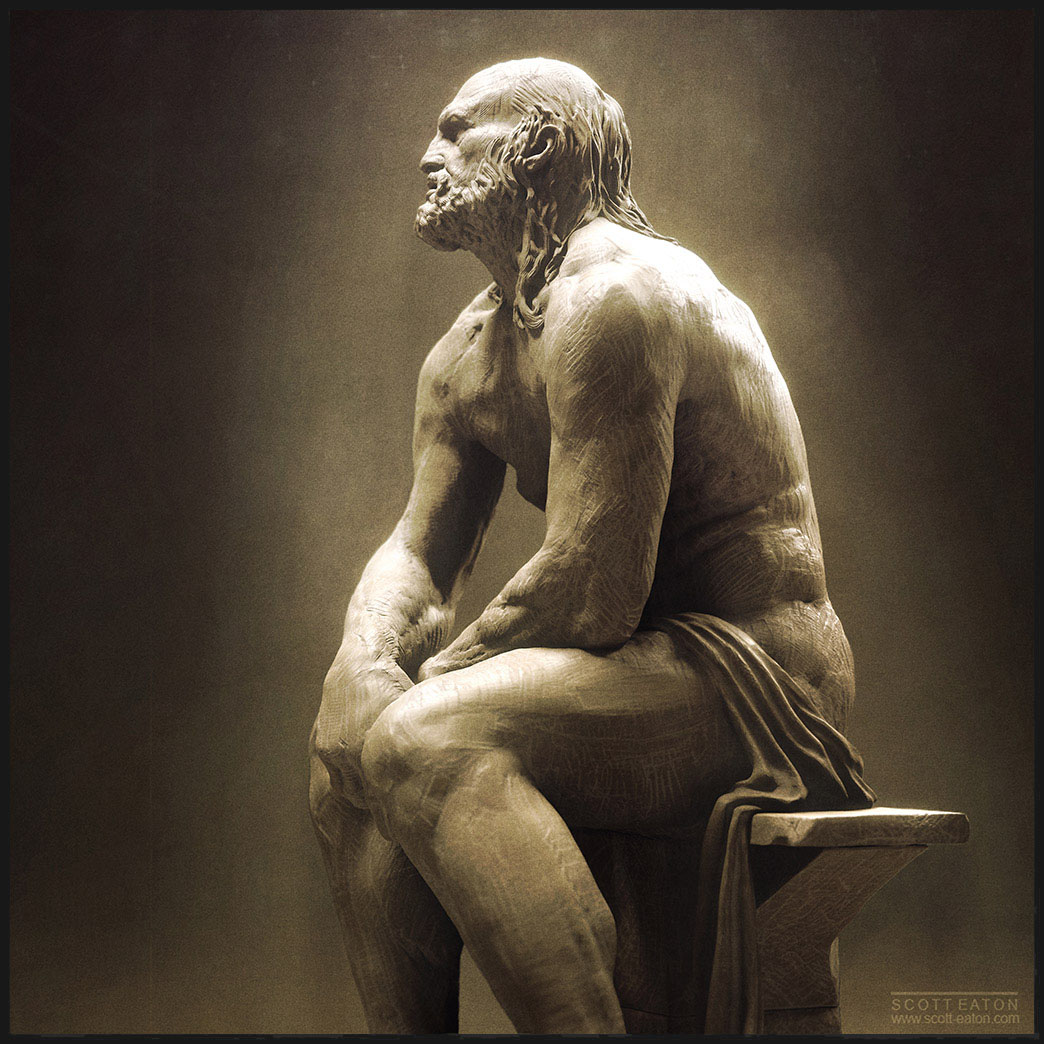Hephaestus greek god - Scott Eaton
First of all, he was the ugliest god ever born. In fact, the gods were supposed to be beautiful with well shaped bodies and glowing faces. Contrary to the beuty of the Olympians, Hephaestus was lame, short and dark skinned.
According to the first version of the story of his life, once Hera having given birth to Hephaestus, she realized that he was lame and not beautiful at all. She got so angry to the fact that she had an ugly baby that she threw from the top of Olympus in order to get rid of him, for fear of being laughed at by the other gods. Hephaestus fell in the ocean where the Oceanides Thetis and Evrinomi found the baby and took him in their underwater cave where they raised him. During his stay at the bottom of the sea, Hephaestus used to create nice jewellery for the Oceanides, made of corals and pearls.
According to second version, Hephaestus became a lame when he had grown up and Zeus exploded with anger to his child after a fight with Hera. Then, he threw the young god from Olympus and Hephaestus had his foot lamed after the fall. In general, Zeus did not love Hephaestus that much and he treated him in a bad way. He was grown up away from his parents and he became an excellent blacksmith. Even though never loved by his own parents due to his ugliness, Hephaestus was considered to be a patient and kind-hearted god.
Regarding his mother, Hera, it is said by Homer (Iliad) that Hephaestus was in very good relations with her. Homer describes it as an ideal love-relation between mother and son. In particular, Hera had asked Hephaestus to assist Achilles during his fight the river Scamandros. Then, Hephaestus spread his flames and attacked to the river making it weak due to drying. Homer describes also a scene where Hephaestus is solacing his mother after a fight with Zeus.
Apart from those cases with Hephaestus is said to have been revengeful towards era after his having been thrown away by her. Hephaestus decided to punish her by sending her a beautiful sculptured throne made of gold. Hera sat in it but she was trapped by invisible nets placed in it by Hephaestus. So, Hera was unable to up and Hephaestus was asked to set her free but he refused to do so unless he was given Zeus’s promise in exchange for accepting Hephaestus as one of the Twelve Gods and getting married to Aphrodite.
Zeus had no choice but making the promise and then Hera was freed. However, Hera who had got angry with her son, decided to make Aphrodite an unfaithful woman thus Hephaestus would be sad due to her.
Consequently, instead of turning herself to a loyal wife, Aphrodite kept being inspired by the Beauty and pursuing love with handsome men.
Being the embodiment of the mood for love, Aphrodite desired the well-shaped and strong Ares who was brutal enough to attract her instincts. However, her secret love affair with Ares was noticed by the Sun who was said to be able to see anything happened, and he informed Hephaestus on his wife’s unfaithfulness.
Then Hephaestus decided to reveal the illegal coupling to all the Olympian gods in order to punish his brother and his wife. So, he placed invisible chains on the bed the couple was to lay and trapped them. Then, he invited the gods to see them and caused brickbats against the illegal lovers. After that, Aphrodite was said to have left Olympus ashamed.
As an expert blacksmith, Hephaestus had constructed several gifts for his brothers and sisters as well as to mortals, including the arrows of Apollo and Artemis, a great scepter for Agamemnon and the thunderbolts of Zeus. He had created the silver cimbaloms that Athena offered to Heracles in order to kill the Stymfalian Birds. Demeter’s reaping hook was also made by Hephaestus. Of course, he had offered a lot of jewellery to his wife Aphrodite and he had taken on the construction and the decoration of the god’s palaces. Achilles was one of the mortals that had been provided with war equipments by Hephaestus who had constructed a unique shield with great decoration for the hero.
Far from being the gods’ blacksmith, Hephaestus was also considered to be the ruler of the volcanoes by the ancient Greeks. He was said to be present when a volcanic activity occurred, especially in Sicily which was considered to be under Hephaestus’s domination.
